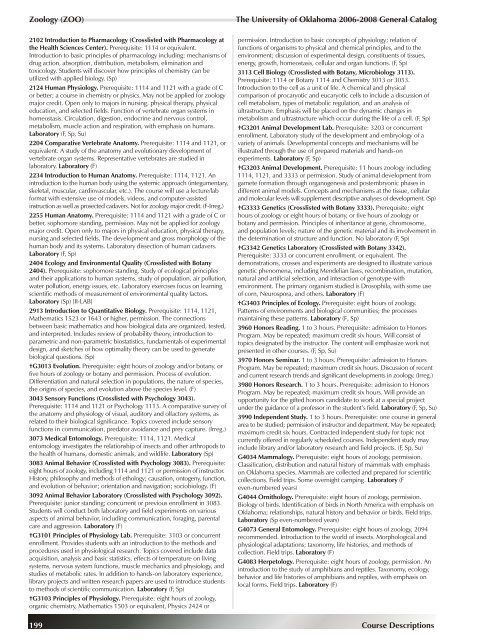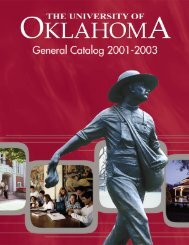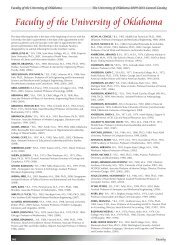Zoology (ZOO)The Uni ver sity <strong>of</strong> <strong>Oklahoma</strong> <strong>2006</strong>-20<strong>08</strong> Gen eral Cat a log2102 Introduction to Pharmacology (Crosslisted with Pharmacology atthe Health Sciences Center). Prerequisite: 1114 or equivalent.Introduction to basic principles <strong>of</strong> pharmacology including: mechanisms <strong>of</strong>drug action, absorption, distribution, metabolism, elimination andtoxicology. Students will discover how principles <strong>of</strong> chemistry can beutilized with applied biology. (Sp)2124 Human Physiology. Prerequisite: 1114 and 1121 with a grade <strong>of</strong> Cor better; a course in chemistry or physics. May not be applied for zoologymajor credit. Open only to majors in nursing, physical therapy, physicaleducation, and selected fields. Function <strong>of</strong> vertebrate organ systems inhomeostasis. Circulation, digestion, endocrine and nervous control,metabolism, muscle action and respiration, with emphasis on humans.Laboratory (F, Sp, Su)2204 Comparative Vertebrate Anatomy. Prerequisite: 1114 and 1121, orequivalent. A study <strong>of</strong> the anatomy and evolutionary development <strong>of</strong>vertebrate organ systems. Representative vertebrates are studied inlaboratory. Laboratory (F)2234 Introduction to Human Anatomy. Prerequisite: 1114, 1121. Anintroduction to the human body using the systemic approach (integumentary,skeletal, muscular, cardiovascular, etc.). The course will use a lecture/labformat with extensive use <strong>of</strong> models, videos, and computer-assistedinstruction as well as prosected cadavers. Not for zoology major credit. (F-Irreg.)2255 Human Anatomy. Prerequisite: 1114 and 1121 with a grade <strong>of</strong> C orbetter, sophomore standing, permission. May not be applied for zoologymajor credit. Open only to majors in physical education, physical therapy,nursing and selected fields. The development and gross morphology <strong>of</strong> thehuman body and its systems. Laboratory dissection <strong>of</strong> human cadavers.Laboratory (F, Sp)2404 Ecology and Environmental Quality (Crosslisted with Botany2404). Prerequisite: sophomore standing. Study <strong>of</strong> ecological principlesand their applications to human systems, study <strong>of</strong> population, air pollution,water pollution, energy issues, etc. Laboratory exercises focus on learningscientific methods <strong>of</strong> measurement <strong>of</strong> environmental quality factors.Laboratory (Sp) [II-LAB]2913 Introduction to Quantitative Biology. Prerequisite: 1114, 1121,Mathematics 1523 or 1643 or higher, permission. The connectionsbetween basic mathematics and how biological data are organized, tested,and interpreted. Includes review <strong>of</strong> probability theory, introduction toparametric and non-parametric biostatistics, fundamentals <strong>of</strong> experimentaldesign, and sketches <strong>of</strong> how optimality theory can be used to generatebiological questions. (Sp)†G3013 Evolution. Prerequisite: eight hours <strong>of</strong> zoology and/or botany, orfive hours <strong>of</strong> zoology or botany and permission. Process <strong>of</strong> evolution.Differentiation and natural selection in populations, the nature <strong>of</strong> species,the origins <strong>of</strong> species, and evolution above the species level. (F)3043 Sensory Functions (Crosslisted with Psychology 3043).Prerequisite: 1114 and 1121 or Psychology 1113. A comparative survey <strong>of</strong>the anatomy and physiology <strong>of</strong> visual, auditory and olfactory systems, asrelated to their biological significance. Topics covered include sensoryfunctions in communication, predator avoidance and prey capture. (Irreg.)3073 Medical Entomology. Prerequisite: 1114, 1121. Medicalentomology investigates the relationship <strong>of</strong> insects and other arthropods tothe health <strong>of</strong> humans, domestic animals, and wildlife. Laboratory (Sp)3<strong>08</strong>3 Animal Behavior (Crosslisted with Psychology 3<strong>08</strong>3). Prerequisite:eight hours <strong>of</strong> zoology, including 1114 and 1121 or permission <strong>of</strong> instructor.History, philosophy and methods <strong>of</strong> ethology; causation, ontogeny, function,and evolution <strong>of</strong> behavior; orientation and navigation; sociobiology. (F)3092 Animal Behavior Laboratory (Crosslisted with Psychology 3092).Prerequisite: junior standing; concurrent or previous enrollment in 3<strong>08</strong>3.Students will conduct both laboratory and field experiments on variousaspects <strong>of</strong> animal behavior, including communication, foraging, parentalcare and aggression. Laboratory (F)†G3101 Principles <strong>of</strong> Physiology Lab. Prerequisite: 3103 or concurrentenrollment. Provides students with an introduction to the methods andprocedures used in physiological research. Topics covered include dataacquisition, analysis and basic statistics, effects <strong>of</strong> temperature on livingsystems, nervous system functions, muscle mechanics and physiology, andstudies <strong>of</strong> metabolic rates. In addition to hands-on laboratory experience,library projects and written research papers are used to introduce studentsto methods <strong>of</strong> scientific communication. Laboratory (F, Sp)†G3103 Principles <strong>of</strong> Physiology. Prerequisite: eight hours <strong>of</strong> zoology,organic chemistry, Mathematics 1503 or equivalent, Physics 2424 orpermission. Introduction to basic concepts <strong>of</strong> physiology; relation <strong>of</strong>functions <strong>of</strong> organisms to physical and chemical principles, and to theenvironment; discussion <strong>of</strong> experimental design, constituents <strong>of</strong> tissues,energy, growth, homeostasis, cellular and organ functions. (F, Sp)3113 Cell Biology (Crosslisted with Botany, Microbiology 3113).Prerequisite: 1114 or Botany 1114 and Chemistry 3013 or 3053.Introduction to the cell as a unit <strong>of</strong> life. A chemical and physicalcomparison <strong>of</strong> procaryotic and eucaryotic cells to include a discussion <strong>of</strong>cell metabolism, types <strong>of</strong> metabolic regulation, and an analysis <strong>of</strong>ultrastructure. Emphasis will be placed on the dynamic changes inmetabolism and ultrastructure which occur during the life <strong>of</strong> a cell. (F, Sp)†G3201 Animal Development Lab. Prerequisite: 3203 or concurrentenrollment. Laboratory study <strong>of</strong> the development and embryology <strong>of</strong> avariety <strong>of</strong> animals. Developmental concepts and mechanisms will beillustrated through the use <strong>of</strong> prepared materials and hands-onexperiments. Laboratory (F, Sp)†G3203 Animal Development. Prerequisite: 11 hours zoology including1114, 1121, and 3333 or permission. Study <strong>of</strong> animal development fromgamete formation through organogenesis and postembryonic phases indifferent animal models. Concepts and mechanisms at the tissue, cellularand molecular levels will supplement descriptive analyses <strong>of</strong> development. (Sp)†G3333 Genetics (Crosslisted with Botany 3333). Prerequisite: eighthours <strong>of</strong> zoology or eight hours <strong>of</strong> botany, or five hours <strong>of</strong> zoology orbotany and permission. Principles <strong>of</strong> inheritance at gene, chromosome,and population levels; nature <strong>of</strong> the genetic material and its involvement inthe determination <strong>of</strong> structure and function. No laboratory (F, Sp)†G3342 Genetics Laboratory (Crosslisted with Botany 3342).Prerequisite: 3333 or concurrent enrollment, or equivalent. Thedemonstrations, crosses and experiments are designed to illustrate variousgenetic phenomena, including Mendelian laws, recombination, mutation,natural and artificial selection, and interaction <strong>of</strong> genotype withenvironment. The primary organism studied is Drosophila, with some use<strong>of</strong> corn, Neurospora, and others. Laboratory (F)†G3403 Principles <strong>of</strong> Ecology. Prerequisite: eight hours <strong>of</strong> zoology.Patterns <strong>of</strong> environments and biological communities; the processesmaintaining these patterns. Laboratory (F, Sp)3960 Honors Reading. 1 to 3 hours. Prerequisite: admission to HonorsProgram. May be repeated; maximum credit six hours. Will consist <strong>of</strong>topics designated by the instructor. The content will emphasize work notpresented in other courses. (F, Sp, Su)3970 Honors Seminar. 1 to 3 hours. Prerequisite: admission to HonorsProgram. May be repeated; maximum credit six hours. Discussion <strong>of</strong> recentand current research trends and significant developments in zoology. (Irreg.)3980 Honors Research. 1 to 3 hours. Prerequisite: admission to HonorsProgram. May be repeated; maximum credit six hours. Will provide anopportunity for the gifted honors candidate to work at a special projectunder the guidance <strong>of</strong> a pr<strong>of</strong>essor in the student’s field. Laboratory (F, Sp, Su)3990 Independent Study. 1 to 3 hours. Prerequisite: one course in generalarea to be studied; permission <strong>of</strong> instructor and department. May be repeated;maximum credit six hours. Contracted independent study for topic notcurrently <strong>of</strong>fered in regularly scheduled courses. Independent study mayinclude library and/or laboratory research and field projects. (F, Sp, Su)G4034 Mammalogy. Prerequisite: eight hours <strong>of</strong> zoology, permission.Classification, distribution and natural history <strong>of</strong> mammals with emphasison <strong>Oklahoma</strong> species. Mammals are collected and prepared for scientificcollections. Field trips. Some overnight camping. Laboratory (Feven-numbered years)G4044 Ornithology. Prerequisite: eight hours <strong>of</strong> zoology, permission.Biology <strong>of</strong> birds. Identification <strong>of</strong> birds in North America with emphasis on<strong>Oklahoma</strong>; relationships, natural history and behavior or birds. Field trips.Laboratory (Sp even-numbered years)G4073 General Entomology. Prerequisite: eight hours <strong>of</strong> zoology, 2094recommended. Introduction to the world <strong>of</strong> insects. Morphological andphysiological adaptations; taxonomy, life histories, and methods <strong>of</strong>collection. Field trips. Laboratory (F)G4<strong>08</strong>3 Herpetology. Prerequisite: eight hours <strong>of</strong> zoology, permission. Anintroduction to the study <strong>of</strong> amphibians and reptiles. Taxonomy, ecology,behavior and life histories <strong>of</strong> amphibians and reptiles, with emphasis onlocal forms. Field trips. Laboratory (F)199 <strong>Course</strong> <strong>Descriptions</strong>
The Uni ver sity <strong>of</strong> <strong>Oklahoma</strong> <strong>2006</strong>-20<strong>08</strong> Gen eral Cat a logZoology (ZOO)G4093 Behavioral Ecology. Prerequisite: 3<strong>08</strong>3 or permission.Interrelationship <strong>of</strong> an animal’s ecology and its behavior. Optimal foragingtheory, habitat selection, predator-prey adaptations, ecological constraintson sexual selection and mating systems.4113 Cellular Pathology (Slashlisted with 5113). Prerequisite: 3113 orpermission <strong>of</strong> instructor. The course focus is on the molecular and cellularbases <strong>of</strong> disease and alterations in cellular processes that lead to thedevelopment <strong>of</strong> various pathological conditions. Topics include symptoms<strong>of</strong> cellular disease, pathology <strong>of</strong> organelles, cell injury, cell death,immunopathology, neoplasia and genetic disorders. No student may earncredit for both 4113 and 5113. (F)G4123 Vertebrate Physiology. Prerequisite: 3103 or equivalent.Physiological function <strong>of</strong> vertebrate organ systems with emphasis on theprocesses <strong>of</strong> adaptation and homeostasis. Topics covered are neurosensoryand motor functions, neuroendocrine function, digestion, metabolism andthermoregulation, respiration, circulation, excretion and osmoregulation. (F)4153 Endocrinology (Slashlisted with 5153). Prerequisite: 3103; 3113strongly recommended. The major emphasis <strong>of</strong> the course is howhormones work at the molecular, cellular, and physiological levels. Thecourse examines the molecular biology <strong>of</strong> hormonal mechanisms and theintegration <strong>of</strong> those mechanisms to maintain crucial homeostatic controlsystems. Hormones and their receptors are considered in terms <strong>of</strong>chemistry, biosynthesis, and mechanisms <strong>of</strong> action. The course focusesprimarily on vertebrate hormones. No student may earn credit for both4153 and 5153. (Sp)G4203 Mechanisms <strong>of</strong> Development (Slashlisted with 5203). Prerequisite:3203, 3201, 3113, or permission. Advanced, laboratory-based coursewhich provides an in-depth analysis <strong>of</strong> selected topics in developmentalbiology. Hands-on laboratory exercises, molecular biology techniques, anduse <strong>of</strong> the primary literature are emphasized. No student may earn creditfor both 4203 and 5203. Laboratory (F)†G4213 Neurobehavioral Development. Prerequisite: 12 hours <strong>of</strong>biology including 1114 and 1121. Specific developmental issues will bediscussed from both the behavioral and biological levels <strong>of</strong> analysis. Cannotbe taken for credit if 6213 has been previously taken. (Irreg.)4223 Cellular and Molecular Neurobiology (Slashlisted with 5223).Prerequisites: 3103, 3113, 3203, or 3333, or permission <strong>of</strong> instructor.Introduction to cellular and molecular neurobiology through reading anddiscussion <strong>of</strong> landmark research papers in five current areas <strong>of</strong> research.Emphasis will be on understanding modern cellular and molecular researchmethods and on critical interpretation <strong>of</strong> scientific data. No student mayearn credit for both 4223 and 5223. (Sp)G4244 Animal Histology. Prerequisite: 3103, 3113 or 3203 or permission.Structure and function <strong>of</strong> animal tissues with emphasis on the cellular basis<strong>of</strong> tissue and organ function. Laboratory emphasizes the identification <strong>of</strong>cells and tissues with the use <strong>of</strong> the light microscope. Laboratory (Sp)G4413 Tropical Ecology. Prerequisite: 3013 or 3<strong>08</strong>3 or 3403. Focuses onunique features <strong>of</strong> tropical ecosystems. Topics include: abiotic features thatgive rise to tropical forests, gap dynamics, tropical biodiversity, plant-animalinteractions, value <strong>of</strong> tropical forests, causes and consequences <strong>of</strong> tropicaldeforestation. (Irreg.)G4462 Limnology. Prerequisite: 12 hours <strong>of</strong> biological sciences, eighthours <strong>of</strong> chemistry, four hours <strong>of</strong> physics, or permission. An introduction tothe biology, chemistry, physics and geology <strong>of</strong> freshwater environments,with emphasis on ecology. (F odd-numbered years)G4472 Limnology Laboratory. Prerequisite: 4462 or concurrentenrollment, or equivalent. Experience in the use <strong>of</strong> the basic limnologicalmethods and application <strong>of</strong> these methods to a variety <strong>of</strong> freshwaterenvironments. Field trips. Laboratory (F odd-numbered years)G4493 Ichthyology. Prerequisite: eight hours <strong>of</strong> zoology. Taxonomy,morphology, ecology and distribution <strong>of</strong> fishes, with emphasis on those <strong>of</strong>the region. Laboratory (Sp every third year, some Su)4713 Introduction to Nematology (Crosslisted with Botany,Microbiology 4713; Slashlisted with 5713). Prerequisite: 12 hours <strong>of</strong>biology. Introduction to field <strong>of</strong> nematology including nematodes <strong>of</strong>importance to human and veterinary medicine, agriculture and theenvironment. No student may earn credit for both 4713 and 5713. (Irreg.)G4823 Physiological Basis <strong>of</strong> Animal Behavior. Prerequisite: 3103.Covers the physiological and neurobiological processes underlyingbehavioral activities such as vision, hearing, olfaction, learning,communication, and reproduction. (Irreg.)4833 Introduction to Neurobiology (Slashlisted with 5833). Prerequisite:3103 or permission <strong>of</strong> instructor. Introduction to cellular and behavioralneurobiology. Topics covered will include cellular neurobiology,neurophysiology, neuroanatomy, sensory processing, movement, andneurobiology <strong>of</strong> behavior. No student may earn credit for both 4833 and5833. (F)4843 Introduction to Molecular Biology (Crosslisted with Botany,Microbiology; Slashlisted with 5843). Prerequisite: 1114 or Microbiology3813 and 3812, or Zoology 1114 and one course in organic chemistry.Introduction to the characteristics and biological functions <strong>of</strong> nucleic acidsand proteins in living cells with emphasis on nucleic acid replication,transcription, translation and regulation; also emphasis on the molecularaspects <strong>of</strong> microbial genetics—transformation, transduction and conjugation;and emphasis on molecular immunology and genetic engineering/recombinantDNA technology. No student may earn credit for both 4843 and 5843. (F)G4853 Neurobiology <strong>of</strong> Memory (Crosslisted with Psychology 4853).Prerequisite: 3103 or Psychology 3073. Advanced seminar dealing withcurrent research on how the nervous system responds to, and is changedby, experience. Experience is broadly defined and may include learning,maturation and/or pathology.4863 Neural Control <strong>of</strong> Movement (Slashlisted with 5863). Prerequisite:eight hours <strong>of</strong> zoology including, 1114, 1121, or permission <strong>of</strong> instructor.Introduction to neural control <strong>of</strong> movement through reading anddiscussion <strong>of</strong> key original research articles from the 19th century to thepresent. Topics include localization <strong>of</strong> function, sensory vs. centralcontributions, roles <strong>of</strong> single neurons, effects <strong>of</strong> neuromodulators, andmotor learning. No student may earn credit for both 4863 and 5863. (F)4871 Current Topics in Neurobiology (Slashlisted with 5871). Prerequisite:Permission <strong>of</strong> the instructor. May be repeated; Maximum credit three hours.A seminar course designed to develop a student’s abilities to interpret andcritically evaluate research in cellular and behavioral neurobiology. Involvesboth public seminars and journal club style discussions <strong>of</strong> contemporaryliterature. No student may earn credit for both 4871 and 5871. (F, Sp)G4903 Computers and Programming in Biology. Prerequisite:twenty-four hours <strong>of</strong> biology or permission. An introduction to the use <strong>of</strong>the zoology department computer facilities: using statistics packages toanalyze data, text editors and formatters to write papers and reports,graphics terminal for plotting, and beginning Fortran and Basic forprogramming on the IBM 3<strong>08</strong>1 and the Apple II microcomputer. (Sp)G4913 Quantitative Biology. Prerequisite: 12 hours <strong>of</strong> biological sciences;a course in statistics recommended. Examination <strong>of</strong> problems in deductiveprobability and inductive statistics. No laboratory (F)4961 Undergraduate Seminar. Prerequisite: 18 hours <strong>of</strong> zoology orpermission <strong>of</strong> instructor. May be repeated; maximum credit two hours.Survey <strong>of</strong> current research programs in environmental biology, cell biology,physiology, animal behavior and other fields presented in weekly publicseminars by visiting scholars and local experts in animal biology. (F, Sp)4970 Special Topics in Zoology. 1 to 3 hours. Prerequisite: three coursesin general area to be studied; permission <strong>of</strong> instructor, department. May berepeated with change <strong>of</strong> topic; maximum credit nine hours. Seminar orspecial topic course; may include laboratory or field work. (F, Sp, Su)4983 Senior Seminar. Prerequisite: 12 hours <strong>of</strong> zoology, senior standing.An interdisciplinary approach will be used to synthesize ideas from themajor fields <strong>of</strong> zoology. Readings and discussion will focus oncontemporary social, ethical and economic issues. (F, Sp) [V]4990 Independent Study. 1 to 3 hours. Prerequisite: three courses ingeneral area to be studied; permission <strong>of</strong> instructor and department. Maybe repeated; maximum credit six hours. Contracted independent study fortopic not currently <strong>of</strong>fered in regularly scheduled courses. Independentstudy may include library and/or laboratory research and field projects. (F,Sp, Su)G5003 Zoogeography. Prerequisite: 12 hours <strong>of</strong> zoology or permission.The determinants <strong>of</strong> animal distributions over the earth. Topics includecontinental drift, dispersal, vicariance biogeography, biogeographicalprovinces, mass extinctions, island biogeography, distribution andabundance. No laboratory. (F odd-numbered years)G5093 Evolutionary Ecology. Prerequisite: 12 hours <strong>of</strong> biology, including3013, or permission. Study <strong>of</strong> ecological forces important in evolutionarychange in plants and animals. Evolution <strong>of</strong> sex, breeding systems, lifehistory, speciation, coevolution <strong>of</strong> animal/plant interactions. (Feven-numbered years)<strong>Course</strong> <strong>Descriptions</strong> 200
- Page 2 and 3:
The General Catalog was produced by
- Page 4 and 5:
The AdministratorsThe Administrator
- Page 6 and 7:
Course De scrip tions Ta ble of Con
- Page 8 and 9:
Accounting (ACCT)Accounting (ACCT)2
- Page 10 and 11:
Aerospace and Mechanical Engineerin
- Page 12 and 13:
Aerospace and Mechanical Engineerin
- Page 14 and 15:
African and African-American Studie
- Page 16 and 17:
Allied Health Studies (AHS)The Uni
- Page 18 and 19:
Anthropology (ANTH)The Uni ver sity
- Page 20 and 21:
Anthropology (ANTH)The Uni ver sity
- Page 22 and 23:
Arabic (ARAB)The Uni ver sity of Ok
- Page 24 and 25:
Architecture (ARCH)The Uni ver sity
- Page 26 and 27:
Art (ART)The Uni ver sity of Oklaho
- Page 28 and 29:
Art (ART)The Uni ver sity of Oklaho
- Page 30 and 31:
Art for Non-Majors (ARNM)The Uni ve
- Page 32 and 33:
Art History (A HI)The Uni ver sity
- Page 34 and 35:
Art History (A HI)The Uni ver sity
- Page 36 and 37:
Atmospheric and Geographic Sciences
- Page 38 and 39:
Botany (BOT)The Uni ver sity of Okl
- Page 40 and 41:
Business Administration (B AD)The U
- Page 42 and 43:
Business Communication (B C)The Uni
- Page 44 and 45:
Chemistry and Biochemistry (CHEM)Th
- Page 46 and 47:
Cherokee (CHER)G6730 Special Topics
- Page 48 and 49:
Civil Engineering and Environmental
- Page 50 and 51:
Civil Engineering and Environmental
- Page 52 and 53:
College of Arts and Sciences (CAS)T
- Page 54 and 55:
Communication (COMM)The Uni ver sit
- Page 56 and 57:
Computer Science (C S)The Uni ver s
- Page 58 and 59:
Creek/Seminole (CREK)The Uni ver si
- Page 60 and 61:
Dance (DANC)The Uni ver sity of Okl
- Page 62 and 63:
Drama (DRAM)The Uni ver sity of Okl
- Page 64 and 65:
Economics (ECON)The Uni ver sity of
- Page 66 and 67:
EDUCATION COURSESThe Uni ver sity o
- Page 68 and 69:
EDUCATION COURSESThe Uni ver sity o
- Page 70 and 71:
EDUCATION COURSESThe Uni ver sity o
- Page 72 and 73:
EDUCATION COURSESThe Uni ver sity o
- Page 74 and 75:
EDUCATION COURSESThe Uni ver sity o
- Page 76 and 77:
EDUCATION COURSESThe Uni ver sity o
- Page 78 and 79:
EDUCATION COURSESThe Uni ver sity o
- Page 80 and 81:
Electrical and Computer Engineering
- Page 82 and 83:
Energy Management (EMGT)The Uni ver
- Page 84 and 85:
Engineering Physics (EPHY)equations
- Page 86 and 87:
English (ENGL)The Uni ver sity of O
- Page 88 and 89:
English (ENGL)The Uni ver sity of O
- Page 90 and 91:
Entrepreneurship (ENT)The Uni ver s
- Page 92 and 93:
Finance (FIN)The Uni ver sity of Ok
- Page 94 and 95:
Geography (GEOG)The Uni ver sity of
- Page 96 and 97:
Geography (GEOG)The Uni ver sity of
- Page 98 and 99:
Geological Engineering (G E)The Uni
- Page 100 and 101:
Geology (GEOL)The Uni ver sity of O
- Page 102 and 103:
Geophysics (GPHY)The Uni ver sity o
- Page 104 and 105:
Graduate College (GRAD)The Uni ver
- Page 106 and 107:
Health and Exercise Science (HES)Th
- Page 108 and 109:
Hebrew (HEBR)The Uni ver sity of Ok
- Page 110 and 111:
History (HIST)The Uni ver sity of O
- Page 112 and 113:
History (HIST)The Uni ver sity of O
- Page 114 and 115:
History of Science (HSCI)The Uni ve
- Page 116 and 117:
Human Relations (H R)Human Relation
- Page 118 and 119:
Industrial Engineering (I E)The Uni
- Page 120 and 121:
Industrial Engineering (I E)The Uni
- Page 122 and 123:
International Courses (INTL)The Uni
- Page 124 and 125:
Japanese (JAPN)The Uni ver sity of
- Page 126 and 127:
Journalism and Mass Communication (
- Page 128 and 129:
Journalism and Mass Communication (
- Page 130 and 131:
Landscape Architecture (L A)documen
- Page 132 and 133:
Law (LAW)The Uni ver sity of Oklaho
- Page 134 and 135:
Law (LAW)The Uni ver sity of Oklaho
- Page 136 and 137:
Law (LAW)The Uni ver sity of Oklaho
- Page 138 and 139:
Liberal Studies (LSTD)The Uni ver s
- Page 140 and 141:
Liberal Studies (LSTD)The Uni ver s
- Page 142 and 143:
Library and Information Studies (LI
- Page 144 and 145:
Linguistics (LING)The Uni ver sity
- Page 146 and 147:
Management Information Systems (MIS
- Page 148 and 149:
Marketing (MKT)The Uni ver sity of
- Page 150 and 151:
Mathematics (MATH)The Uni ver sity
- Page 152 and 153:
Mathematics (MATH)The Uni ver sity
- Page 154 and 155:
Medieval and Renaissance Studies (M
- Page 156 and 157: Meteorology (METR)The Uni ver sity
- Page 158 and 159: Microbiology (MBIO)The Uni ver sity
- Page 160 and 161: Military Science (M S)The Uni ver s
- Page 162 and 163: Music—AppliedThe Uni ver sity of
- Page 164 and 165: Music Education (MUED)The Uni ver s
- Page 166 and 167: Music Literature (MULI)The Uni ver
- Page 168 and 169: Music Technique (MUTE)Music Techniq
- Page 170 and 171: Music Technology (MUTK)The Uni ver
- Page 172 and 173: Native American Studies (NAS)Native
- Page 174 and 175: Petroleum Engineering (P E)The Uni
- Page 176 and 177: Philosophy (PHIL)The Uni ver sity o
- Page 178 and 179: Philosophy (PHIL)The Uni ver sity o
- Page 180 and 181: Physics (PHYS)The Uni ver sity of O
- Page 182 and 183: Political Science (P SC)The Uni ver
- Page 184 and 185: Political Science (P SC)The Uni ver
- Page 186 and 187: Political Science (P SC)The Uni ver
- Page 188 and 189: Portuguese (PORT)The Uni ver sity o
- Page 190 and 191: Psychology (PSY)The Uni ver sity of
- Page 192 and 193: Regional and City Planning (RCPL)Th
- Page 194 and 195: Religious Studies (RELS)The Uni ver
- Page 196 and 197: Social Work (S WK)The Uni ver sity
- Page 198 and 199: Sociology (SOC)The Uni ver sity of
- Page 200 and 201: Sociology (SOC)The Uni ver sity of
- Page 202 and 203: Spanish (SPAN)The Uni ver sity of O
- Page 204 and 205: University College (UCOL)The Uni ve
- Page 208 and 209: Zoology (ZOO)The Uni ver sity of Ok
- Page 210 and 211: In dex of CoursesThe Uni ver sity o








